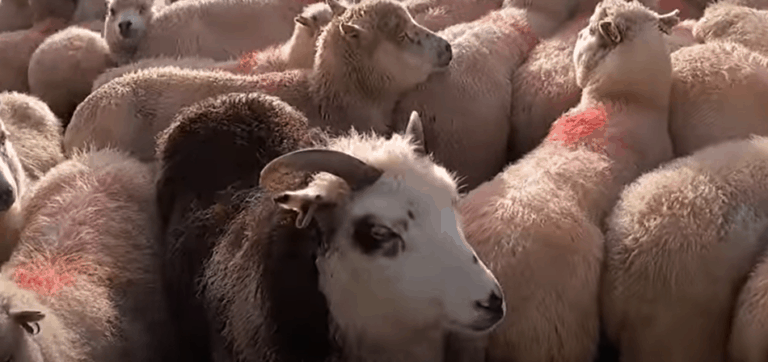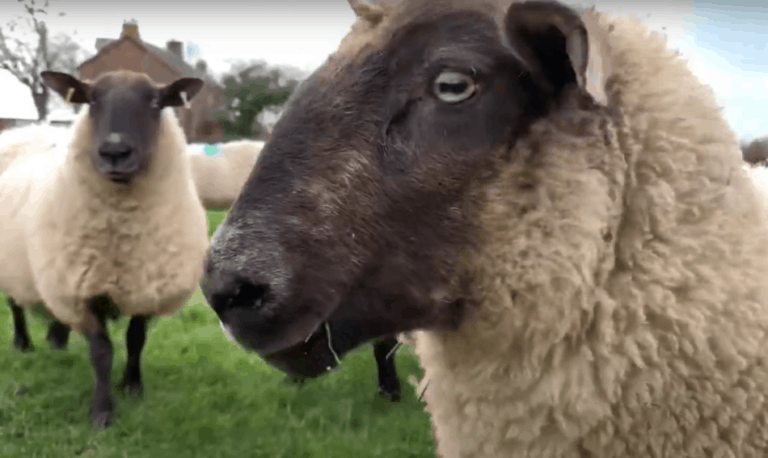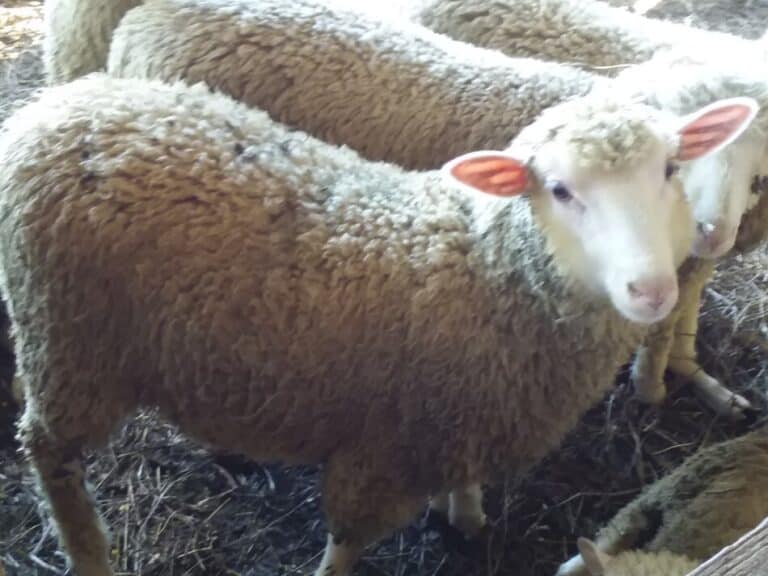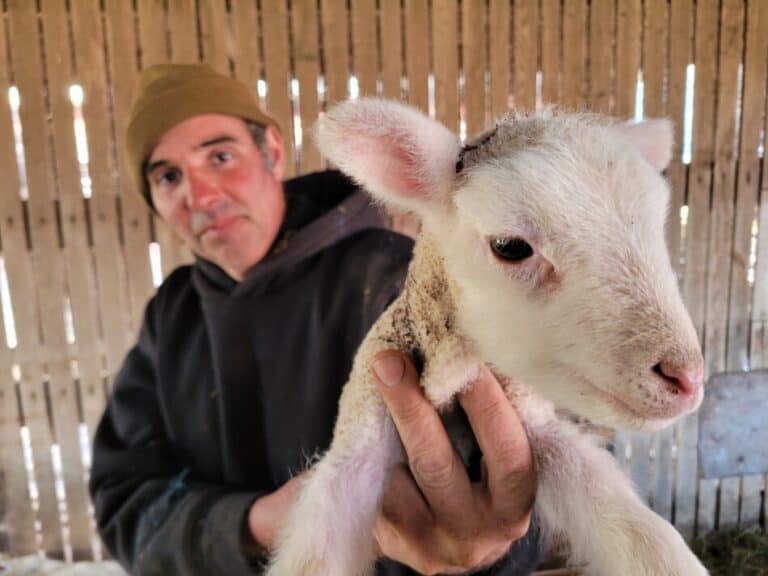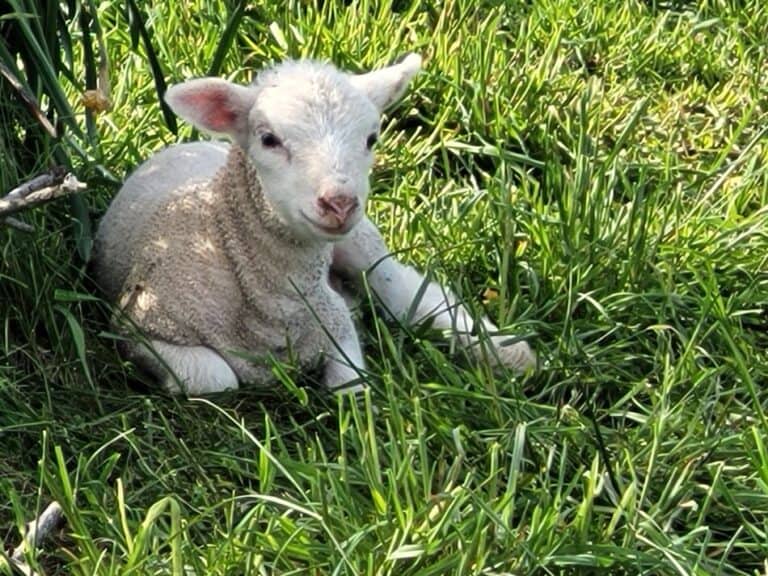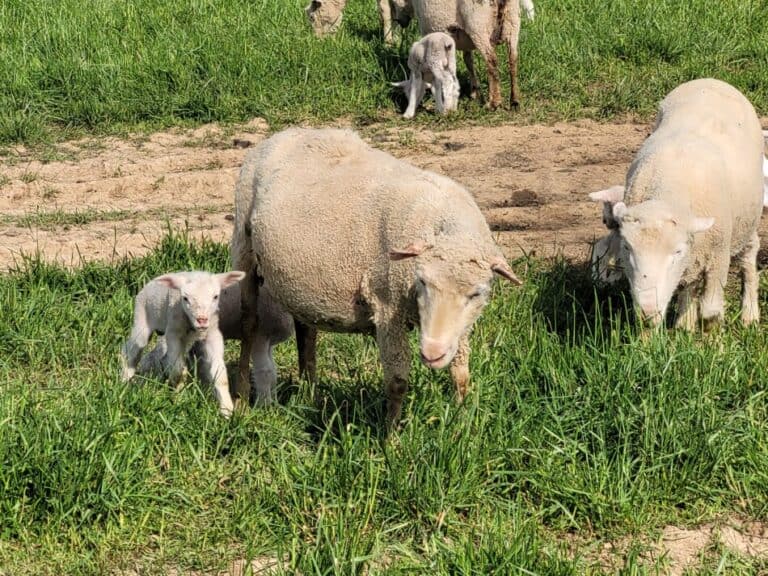Buying Sheep: Where To Look And What You’ll Pay
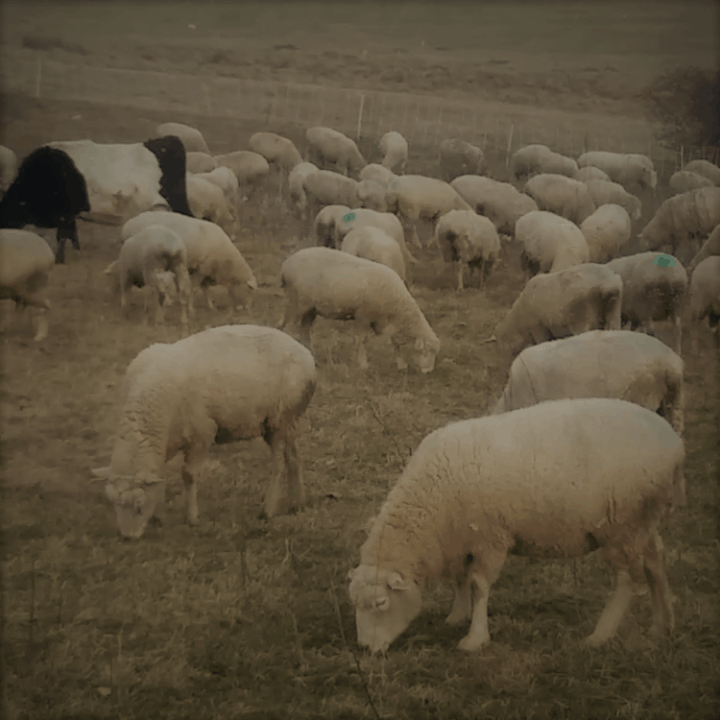
Thinking of getting started with sheep? Good call! Sheep are rising in popularity with small farm enthusiasts and health focused consumers.
Now, on to getting a flock for you: where should you buy them and how much will it cost?
Buy a starter flock of sheep from a breeder who is raising sheep the same way you want to raise your sheep. Expect to pay $300-400 per adult ewe and $600-800 per adult ram.
Straight out of the gate, let’s handle the “Which breed is best” question. There isn’t a best breed, don’t let anyone tell you otherwise!
However, if you are wondering which breed or cross breed will work the best for me and my farm? Now we are getting somewhere!
Raising Sheep For Profit goes over more of the income and expenses side of raising sheep, including a budget that you can adjust to fit the prices in your area.
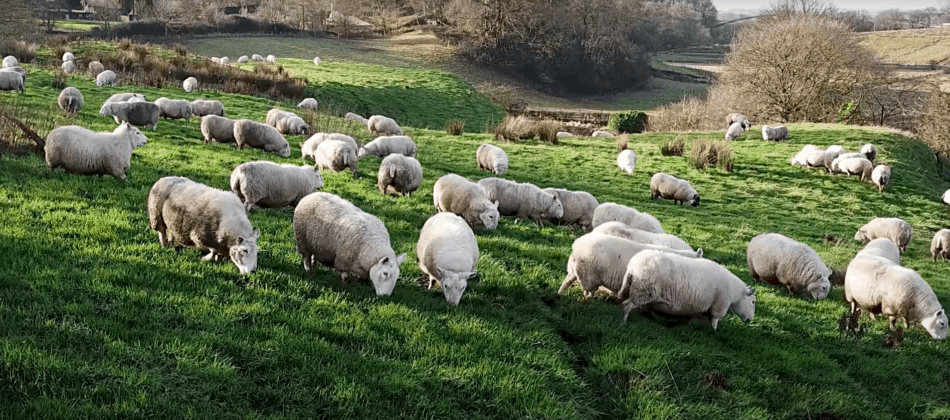
Matching the best abilities of the sheep with what you need for the flock to do at your farm is the key to successful sheep raising.
To discover the right sheep breed for you and your farm, read my article How To Find The Right Sheep Breed For You.
Need more details on raising sheep, like general care and feeding information? Check out my article Complete Guide To Raising Sheep.
Determine the main purpose for your flock
Consider what your market wants. Do you want chunky 60 pound roaster lambs, 120 pound grain finished lambs, 90 pound grass only lambs?
Are you wanting to get into showing sheep or raising lambs for the fair market lamb classes?
These are all very different sheep raising goals that will be best served with very different sheep.
Buy your sheep from a local farm
The best place, bar none, to buy sheep is from a local shepherd who is raising sheep at her farm the same way that you want to raise sheep at your farm.
It is much easier to get sheep from the start that are adapted to your location and are proven to perform under the same circumstances that you will have at your farm.
If the two paragraphs you just read are not crystal clear to you, reread them until you understand them. This is key information.
Sheep adapted to your area save you money
Why is getting adapted sheep such a big deal? It saves you money, mainly in time/disappointment and culling.
When you change the way your sheep are raised from what they are used to, you will have to cull out a higher number of low performing sheep or do extra for the sheep to help them thrive on your farm.
Don’t get me wrong, you’ll always have a bit of culling to do, it’s a normal part of livestock raising.
Lower rates of culling sheep that couldn’t make the adjustment to your farm equals the best use of your initial flock investment money.
You have options on sheep ages
- Proven ewes (2-3+ year olds that have had one set of lambs)
- Ewe Lambs
- Older (still productive) ewes
You have some options regarding what age of sheep to get, generally people would be looking to buy younger (2-3 year olds that have has at least one set of lambs) ewes or ewe lambs.
Start with proven ewes for your first flock
If at all possible, start with the ewes! You will pay more per head if you buy the ewes vs. the ewe lambs, but you’ll be glad you did.
Ewes have experience and should have flock records showing how she did with her lambs last year.
You’ll have proof that she knows what she’s doing is worth your investment.
Ewe lambs need a more experienced shepherd
I’m sure you’ve read that less expensive way to get started with sheep would be to buy ewe lambs.
I can not support this idea for first time sheep owners!
Ewe lambs are less money because they are a higher risk purchase.
What? Yes, ewe lambs are not proven as productive members of the flock, they are just maybes.
Not all ewe lambs will breed and new moms are the ones most likely to have confusion and refusals with lamb care.
Older ewes can make a great starter flock
There is one (not very popular), money saving option that I can support for new flock owners: buying older ewes.
Older ewes are higher risk than prime of life ewes. To be clear, we are not talking junky culls here, just past prime of life ewes.
The ewes I am referring to are ewe that are being sold because the shepherd wants to keep the overall age of her ewes lower.
These gals are still doing a great job as moms and are keeping themselves in great condition as well.
This is mandatory, if she’s not taking care of herself and her babies she is not something you want!
I’m sure you’re next question is something like “If those older ewes are so great, why are they being sold?”
Great question! For most flock owners, space is limited. Not all sheep that are good sheep can stay.
It’s ironic, the better the ewe flock is the more likely they will have great commercial value older ewes for sale, sometimes every year!
Meaning great shepherds will have great older ewes for sale (if she is not expanding numbers).
While it is true that starting with an older ewe will mean culling your original sheep sooner than if you had started with younger stock, you will have the opportunity to keep back your own ewe lambs from proven to be superior ewes.
Buying older ewes is not golden! Older ewes are a higher risk purchase than a younger proven ewe due to normal aging (she won’t live forever!) and the tendency for metabolic problems to be more likely in older ewes.
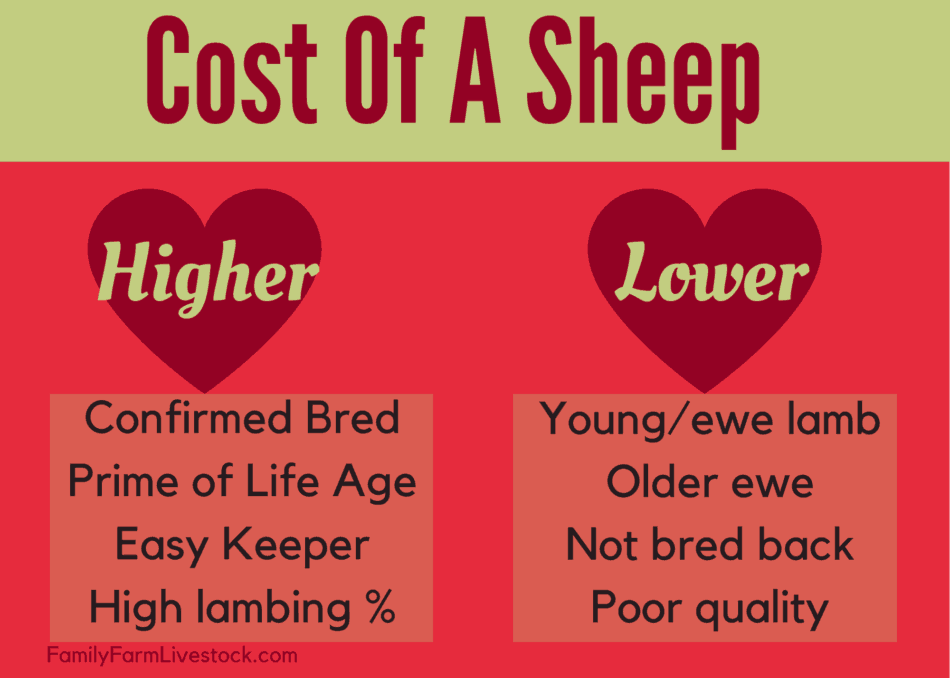
Do not buy sheep at the auction
Do not buy your breeding stock sheep at the weekly livestock auction.
The sheep that run through there are either market animals or non productive culls.
Occasionally, you might get lucky and find some great sheep for a low price.
However, it is much more likely that you will be buying someone else’s problems and poor performers (or flat out money pits).
Do yourself a favor and get good sheep to begin with, cheaping out at the beginning will cost you big in the future.
Cost to buy sheep is $300-400 each
I would expect to pay from $300-400 per adult ewe. Closer to $300 if she’s open (not bred) and $400+ if she’s due to have lambs in the next few weeks to a month.
Expect to pay more for an adult ram, in the $600 range.
Remember, the ram is half of the genetics of your market lambs and of any replacement ewe lambs you decide to keep.
I know it can be hard to cough up the cash for a high quality ram, especially when tempted with a local cheapie.
Please, don’t cheat yourself. Quality pays is the saying and I like to add repeatedly pays. Good sheep are worth the money!
(The more negatively focused famous phrase is Pay now, or pay later. So, true.)
Some sheep will cost more
There are a few times of the year when you should expect to pay more for breeding stock, if it is still available, and a few situations where the sheep you want will cost more than normal.
Ready to lamb ewes will be higher priced
For time of year, right before lambing will be the highest price.
Why? The shepherd has put all of the time and money into the sheep but has not got any money back from them for the year.
Open (not bred) ewes will be lower priced
Ewes that have just weaned lambs and are not bred back yet are referred to as being “open”. Open means not bred at the time of purchase.
These ewes have just paid the shepherd for the year and the shepherd will not have any extra time and money into these yet.
Once the ewes are bred they have more value and will cost more since they hare started the reproduction cycle again.
Unusual breeds of sheep will cost more
The other situation that will raise the cost of the sheep, possibly significantly, is unusual or rare breeds.
To be honest with you, your money and your time will be better spend getting used to sheep first.
A “normal breed” of sheep will be more forgiving of your mistakes and learning experiences.
Once you’ve spend some time caring for your flock and discovered that you enjoy having sheep in your life, now you are in a good position to consider a rare or unusual breed.
Get a fair price buying sheep by doing research
First off, know the market. If market lambs are selling for $200 each and you are only willing to pay $100 for a productive ewe, getting sheep worth having is unlikely.
In this situation, demand is high, so you will need to pay more for the ewes than if demand is low.
Demand for lamb seems to be rising so don’t count on fire sale prices any time soon.
If possible, look up breeding stock sale results for the past year or so. Find a sale in your area or look at NSIP Eastern sale results to get you started with an idea of the likely cost of getting high quality sheep.
We purchased two rams at this sale. It is mostly going to be rams on the list, however, it is still a current sale result and there were a few ewes that sold. Check it out, it’ll give you a good idea of prices.
Once you’ve done your research, you’ll know what is appropriate and what is not for your area. You checked the market reports and did some math, right? If not, you need to.
A commercial ewe is worth the money for one year’s lambs
I usually figure that a commercial ewe is worth at least the money the shepherd would get from a year’s worth of lambs.
Notice the commercial ewe part, if you are looking at show stock or special breeds, the price will be higher since the lambs will sell for more.
Here’s an example: right now (in my part of Ohio) we are getting $250 each for market lambs. If you average the production per ewe to be 1.5 lambs per year 1.5 x $250= $375.
That’s a reasonable minimum for an open, regular everyday 3 year old ewe.
If she’s bred, has family history of higher than normal lambing rates, is an easy keeper, has parasite resistance and so on, she will be more money because she’s worth more money.
Politely ask about the best sheep price
If you are not looking to spend the amount of money the shepherd wants you can politely ask if that is the best she can do on price.
If she holds to her price, it’s likely she will since sheep are in high demand now, accept that you need to either pay the asking price or not get these sheep.
The reason I bring this up is that we have had people wanting to buy some of our stock, not just sheep, and freak out over a reasonable price.
To be blunt, it is insulting. Please, don’t be that person.
Everyone has a differing opinion on value of sheep for his or her situation, that’s normal. Agreeing is not mandatory!
Anyone who has sold sheep before knows that not all potential buyers will like what they see and be willing to pay the price the shepherd wants.
When you go to a farm, be respectful and honest just like the shepherd will be with you.
If you can work out a purchase, super! If not, now you have some experience with getting into sheep and you can reevaluate your plan and search around for other sheep.
The most important part of any deal is the people involved.
Even if you decide to get sheep from another shepherd, you’ll want stay on good terms with any shepherd you speak to.
Most sheep people love to talk sheep, especially with new shepherds, and you need to be talking to experienced sheep raisers!
Sheep 201 is an excellent site for any person interested in sheep. This link is to the index, so you can see all of the topics covered on the site. Click around, there is a ton of useful information here!
